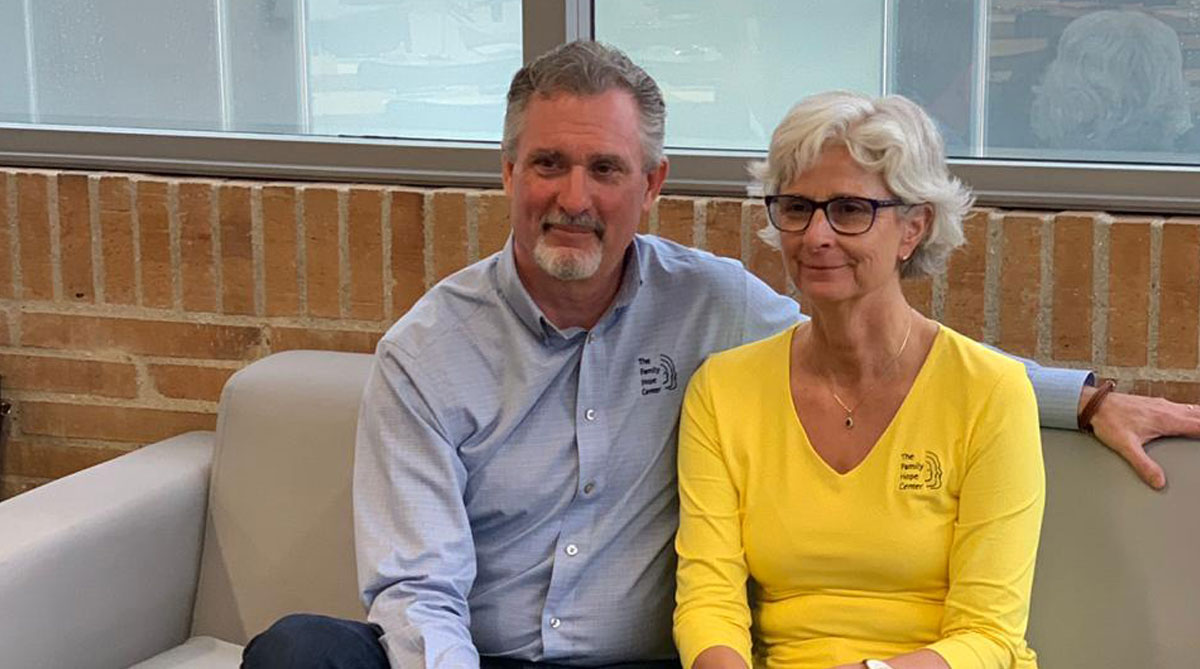All parents want their children to be happy, healthy, and successful, but your child is struggling neurodevelopmentally.
It’s hard for you to see your child frustrated, sad, and struggling to reach their true potential.
The experts are telling you there is very little you can do for your child and not to expect much.
You worry about your child’s future – will they be able to take care of themselves when you are not there anymore?
You want your child to get better, but they are not making progress.
No matter what though, you will not stop looking for ways to help your child.


Liz Strawbridge, MD
After suffering a stroke and severe meningitis, my 4-year-old son was left with right sided motor impairment, difficulty with short and long-term memory, spatial disorientation and sensory processing issues. As many parents who suffer the trauma of having a brain-injured child, we could see his heart and soul were still bursting with abundant life and beauty.
The Thompson Family
We are a family of six. My husband and I have four children. Our second child, Ben, started receiving services for autism at age two and a half. We were very proactive and diligent in seeking therapies and advice from the best, but after nine years of speech, occupational, physical, and behavioral therapies, Ben, at age eleven and a half, still struggled immensely
I wanted to go to the movies or church without having an emergency exit plan. I wanted my son to have the internal motivation to do things for himself or others, and not constantly have to bribe him with screen time or treats. I wanted him to learn to ride a bike, tie his shoes, bathe himself, create stories, respect people’s things, and engage with his family.
After nine years of conventional therapies, none of those goals were achieved.
We knew more was possible; we just had no idea how to achieve it.
How We Help In 2 Minutes
The experts say your child can’t improve.
We are sure they can.
We’ve helped thousands of parents significantly strengthen their children’s neurological abilities.
We look forward to partnering with you to teach you how to do the same.
Watch the video about how we help in 2 minutes:

Liz Strawbridge, MD
It made much more sense to me that we should be working on creating new neurological pathways rather than trying to fix the manifestation of the broken ones…
As a physician, I was very familiar with the conventional treatment plan of PT and OT laid forth by his brilliant team of doctors at Boston Children’s Hospital. I was struck by how these therapies addressed the symptoms (muscle weakness) rather than the root of the problem (a hurt brain). The Parent Training Course is a crash course in neurodevelopment which dovetailed beautifully with recent data around the science of neuroplasticity. The Family Hope Center uses detailed anatomical and developmental neural network maps in the brain to evaluate where along the timeline of brain development your child suffered injury, causing a dysfunctional pathway for that particular network resulting in downstream consequences…We saw significant gains after working on the program with our son for 6 months. Both his neurologist and neurosurgeon have been blown away by his progress. The program helps your child adapt and become more resilient, not just get ‘band aid solutions’ that don’t promote his or her potentiality and evolution.

The Thompson Family
If you were ever told that your child is incapable or have been force-fed a “doom and gloom” prognosis, then it is time to remove those professionals from your roster and sign on new talent…
For the last five years we have been implementing the comprehensive neurological approach designed by the FHC team…We as a family have witnessed neuroplasticity and continue continue to see that growth is possible…we are no longer fearful. We know our power. We know the brain grows when a family rallies behind the one struggling and stands united in implementing an evidence-based systematic approach in a loving home… Ben is now independently bathing, riding a bike, tying his shoes, writing and reading, balancing a checkbook, doing chores, running, playing sports, and so much more.
We Are Believers, For Good Reason
For more than 40 years,we’ve studied the neurological origins of disabilities in children and developed practical, effective ways of promoting brain healing and growth.
We started our own family during the early part of this 40-year journey. Two of our children faced complex neurodevelopmental difficulties
We applied the same approaches to our children that we teach to all parents, and with lots of love, hard work, and dedication, our children overcame their challenges.
Today, our daughters are confident adults with meaningful relationships and purposeful professional lives.
So, we have two perspectives to share with you—one as parents and one as professionals.
As parents, we truly understand what you are going through, and we know how resilient you are.
As professionals, we know that with few exceptions, every injury to the brain is capable of healing – given the correct approach, dedicated effort, and time.
LEARN
Learn How Your Child’s Brain Works And Grows
Understand how injuries and poor function in the brain show up as developmental delays, learning disabilities, and other diagnoses like ADHD and autism.
ASSESS
Assess Your Child’s Current Neurodevelopmental Abilities
Measuring the developmental and functional abilities of your child is the most vital step in building a successful plan to help them.
Use our parent-friendly evaluation tool to evaluate how your child’s brain is developing and find out which neurological pathways and physiological systems need the most support.
IMPLEMENT
Implement Your Child’s Individualized Home-based Neurodevelopmental Treatment Plan
Take personal control of your child’s neurotherapeutic activities and nutrition as you implement their treatment plan in your home.
PROGRESS
Update Your Child’s Neurodevelopmental Treatment Plan As They Develop And Progress
Neuroplasticity is a reality, and as you work with your child at home, you will begin to see positive changes. As that happens, you will periodically reassess your child to account for this growth. Each reassessment will provide you with an easy and objective way to see how your child is progressing and will be the basis for your child’s updated treatment plan.
Conditions We Address
At the Family Hope Center, we work with parents of children who have an extensive and complex array of neurologically based challenges, (dis)abilities, and disorders.
If your child’s difficulties are of neurological or neurodevelopmental origin or if they have a medical or genetic condition with neurodevelopmental consequences, we can help.
We work with parents of children who have received the following diagnoses:

Measuring Results
The effectiveness of any therapeutic approach must be periodically assessed using standardized and validated measures. The Family Hope Center assesses the effectiveness of its approach using the WeeFIM®, the pediatric version of the Functional Independence MeasureTM (FIM®).
Both the FIM® and WeeFIM® were developed by Uniform Data System for Medical Rehabilitation (UDSMR) from the World Health Organization’s bio-psycho-social model of disability. They are functional assessment tools for evaluating essential abilities in individuals with neurodevelopmental disabilities along three dimensions: self-care, motor function, and cognition.
UDSMR notes: “Since its inception in 1987, the FIM® instrument has been widely regarded and adopted by clinicians and researchers around the world for its brevity and reliability. A sizeable library of supporting research and study sustains the FIM® instrument’s reliability and validity. To date, more than 1,300 published articles support the FIM® instrument, and ongoing research and study continues.” (Read more clinical research about the WeeFIM here).
Our WeeFIM® results show that children’s neurological and functional capabilities significantly improve through the Family Hope Center’s parent-implemented home-based therapy.
Conditions We Address
At the Family Hope Center, we work with parents of children who have an extensive and complex array of neurologically based challenges, (dis)abilities, and disorders.
If your child’s difficulties are of neurological or neurodevelopmental origin or if they have a medical or genetic condition with neurodevelopmental consequences, we can help.
We work with parents of children who have received the following diagnoses:
Measuring Results
The effectiveness of any therapeutic approach must be periodically assessed using standardized and validated measures. The Family Hope Center assesses the effectiveness of its approach using the WeeFIM®, the pediatric version of the Functional Independence MeasureTM (FIM®).
Both the FIM® and WeeFIM® were developed by Uniform Data System for Medical Rehabilitation (UDSMR) from the World Health Organization’s bio-psycho-social model of disability. They are functional assessment tools for evaluating essential abilities in individuals with neurodevelopmental disabilities along three dimensions: self-care, motor function, and cognition.
UDSMR notes: “Since its inception in 1987, the FIM® instrument has been widely regarded and adopted by clinicians and researchers around the world for its brevity and reliability. A sizeable library of supporting research and study sustains the FIM® instrument’s reliability and validity. To date, more than 1,300 published articles support the FIM® instrument, and ongoing research and study continues.” (Read more clinical research about the WeeFIM here).
Our WeeFIM® results show that children’s neurological and functional capabilities significantly improve through the Family Hope Center’s parent-implemented home-based therapy.
Conditions We Address
At the Family Hope Center, we work with parents of children who have an extensive and complex array of neurologically based challenges, (dis)abilities, and disorders.
If your child’s difficulties are of neurological or neurodevelopmental origin or if they have a medical or genetic condition with neurodevelopmental consequences, we can help.
We work with parents of children who have received the following diagnoses:
Measuring Results
The effectiveness of any therapeutic approach must be periodically assessed using standardized and validated measures. The Family Hope Center assesses the effectiveness of its approach using the WeeFIM®, the pediatric version of the Functional Independence MeasureTM (FIM®).
Both the FIM® and WeeFIM® were developed by Uniform Data System for Medical Rehabilitation (UDSMR) from the World Health Organization’s bio-psycho-social model of disability. They are functional assessment tools for evaluating essential abilities in individuals with neurodevelopmental disabilities along three dimensions: self-care, motor function, and cognition.
UDSMR notes: “Since its inception in 1987, the FIM® instrument has been widely regarded and adopted by clinicians and researchers around the world for its brevity and reliability. A sizeable library of supporting research and study sustains the FIM® instrument’s reliability and validity. To date, more than 1,300 published articles support the FIM® instrument, and ongoing research and study continues.” (Read more clinical research about the WeeFIM here).
Our WeeFIM® results show that children’s neurological and functional capabilities significantly improve through the Family Hope Center’s parent-implemented home-based therapy.
What We Are Offering You
We believe that loving families make the best therapists.
We also know that the brain has an incredible capability to heal. Our job is to give parents the tools to make that happen.
With that in mind, we make the following commitments to you:

Nellie, Pete’s Mom
I was embarrassed by his actions most of the time and was getting desperate for help. My loving friends told me about the Family Hope Center and dragged me to the 3-day parent training. At the training, many of the behaviors I’d observed were no longer a mystery…
We didn’t realize our child (Pete) had special needs until he was about twelve years old. He just seemed quirky, and like a very bright young man who just didn’t want to do schoolwork and couldn’t get along with people. We carried a heavy burden of guilt for not helping Pete sooner, for not seeing his needs, and for not being able to do all the program. Yet, we kept at it…Today, Pete is nearing the end of the program, and he is motivated to do it on his own. He’s nearly eighteen years old…Without the concerted effort of getting him [neurologically] organized, Pete wouldn’t be driving, working, or graduating high school. I’m not worried about him ending up in jail because he exploded at the wrong time. He has friends and will be able to self-regulate in the stresses of life. His anxiety is gone, he has a bright future, and he’s a delight. The program is a gift. The results are priceless.

Pete, Nellie’s Son
At the time of this writing I am seventeen years old. I’ve been doing this program for just over three years now. And whereas at the start, when I didn’t see the point of what I was doing, I now see the benefits.
I missed pizza and soda, and a load of other stuff. In short, I hated the diet. I hated the exercise. Now that the end is in sight, and my neurology has pretty much caught up to the best it’s going to be, I can say for certain that this program is easily worth its weight in gold. I have friends now. I can react to change, learn, and grow as a person. I’m a better human being. You’re the parent, you make them do it because eventually they will want to as well. Then you’ll get to stop pushing. I’m grateful my mom made me do it.
Get To Know Us More


Nancy Werner, MD
It is thrilling to see the decades of dedication spearheaded by Matthew and Carol Newell and their diverse team at the Family Hope Center encapsulated in this book. In it, their philosophy, approach, and results in overcoming neurological injuries—even the most severe cases—are made accessible to professionals and families alike.
Yet, beyond their extensive experience in the recovery of neurologically injured children, their work demonstrates exciting potential in the enhancement of well-being and achievement in youngsters of “normal” families. I can attest to the brilliant results this program can elicit through its solid and well-documented multidisciplinary agenda in nurturing families who deal with the enormous challenges of raising an injured child, and the benefits that spill over to siblings and parents. In the fullest sense of the word, the Family Hope program can “raise” an individual to her fullest potential. This book provides a broad picture of previously unsuspected possibilities in neurological recovery and effective parenting.
Linda Baker, MD, CCH, Portland, OR
If you’re the parent of a special needs child, please read this book. You will find an empowering and refreshing way of viewing your child’s condition. The information presented here will help you to understand what is happening, to get to the root cause of the problem and give you a roadmap for helping your child to heal.
Recent studies are showing that our brains have much greater ability to heal than is generally appreciated. In this book you will find a scientific, practical, and well researched method for assisting that healing process. During the years I consulted with families at FHC (Family Hope Center), I saw hundreds of children who surprised me with the progress they made on this program, well beyond anything I’d seen or been taught to expect in my pediatric training. If I were a child with a brain injury, I would be hoping that my parents would find this book and follow its recommendations.
Our Specialists
Our interdisciplinary team specializes in multiple fields of medicine and therapy with one thing in common: helping you learn how to optimize your child’s brain growth and development.


























